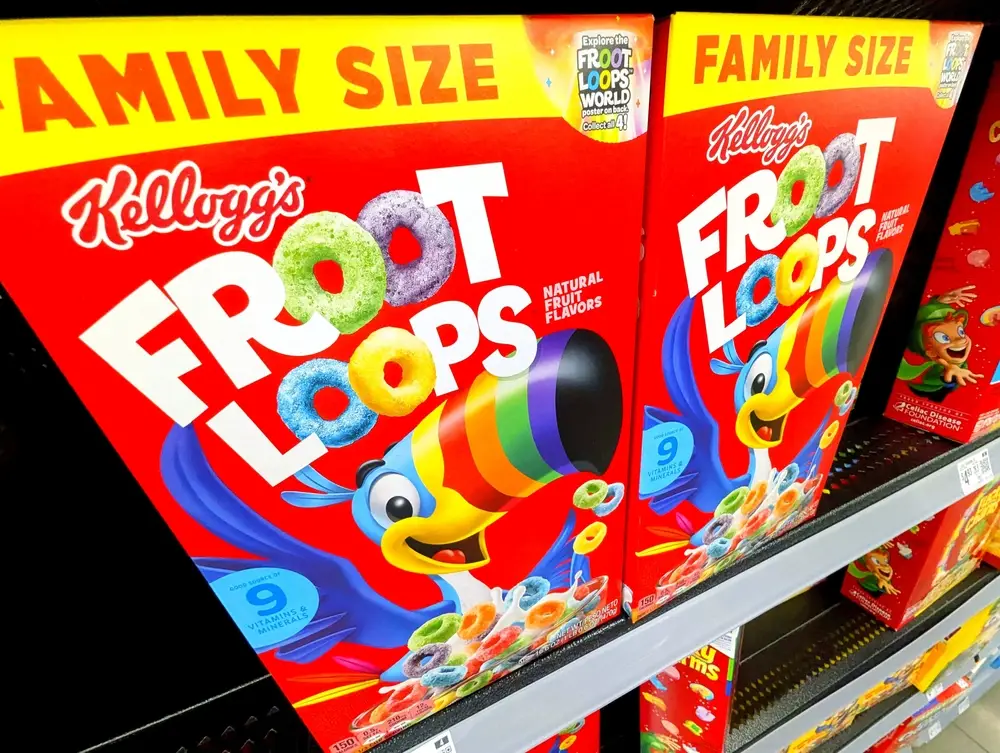A Kellogg’s Froot Loops class action has been filed in New York, accusing WK Kellogg Co. and retail giant Walmart Inc. of misrepresenting serving sizes on boxes of Froot Loops with Marshmallows cereal. The case, led by plaintiff Thomas Harvey, highlights growing scrutiny over food labeling practices and has become a focal point for both consumers and legal observers.
Now pending in the U.S. District Court for the Eastern District of New York, the case is officially titled Harvey v. WK Kellogg Co. and Walmart Inc., Case No. 2:2025cv03984. It was filed on July 17, 2025, and is being overseen by Magistrate Judge James M. Wicks.
This Froot Loops false advertising lawsuit is in its early stages, but it could carry significant implications for supermarkets, food manufacturers, and New York consumers alike.
What the Lawsuit Claims
According to court filings, the Kellogg serving size lawsuit centers on the popular cereal's labeling. On its “Nutrition Facts” panel, the product typically lists a serving as 1 ⅓ cups (39 grams) and claims that a 16.2-ounce (459-gram) box contains “about 12 servings.”
Independent laboratory testing, commissioned by the plaintiff, however, found that the average serving actually weighs about 45.26 grams. Based on this calculation, a 16.2-ounce box would provide closer to 10 servings, not 12. This represents a potential shortfall of roughly 15% compared to what is advertised.
The Froot Loops with Marshmallows lawsuit alleges that this discrepancy misleads consumers into believing they are purchasing more servings than they actually receive. The complaint accuses Kellogg and Walmart of violating New York General Business Law Sections 349 and 350, which prohibit deceptive business practices and false advertising. Additional claims include breach of warranty and unjust enrichment.
Products and Consumers Affected
The case covers three different box sizes of the cereal:
- 9.3 ounces
- 16.2 ounces
- 23.7 ounces
Each of these is alleged to have been marketed under the same serving size representations. Plaintiff Thomas Harvey argues that all three sizes are misbranded under both federal and state law.
In this Kellogg’s Froot Loops class action, the plaintiff seeks to represent all New York residents who purchased Froot Loops with Marshmallows for personal, family, or household use, within the relevant statute of limitations. While the case currently applies to New York consumers only, its outcome could influence how cereal manufacturers nationwide approach labeling.
What Consumers Could Receive
If the Froot Loops false advertising lawsuit succeeds, eligible consumers may receive compensation for overpayment. The court could also order injunctive relief requiring Kellogg to revise its labeling practices.
At this stage, no settlement has been approved, and the exact payout structure remains unknown. Typically, in similar food labeling and packaging class actions, consumers who purchased the affected products may later be invited to submit claims for partial refunds or vouchers.

How the Case Reached Court
Thomas Harvey, the lead plaintiff, filed the complaint after years of buying the product. According to filings, he most recently purchased a box from a Walmart store in Commack, New York, in February 2024. Relying on the Nutrition Facts panel, Harvey states he believed he was receiving 12 servings as listed.
The lawsuit describes this as a violation of state consumer protection laws and a classic case of Kellogg's cereal serving misrepresentation.
Court Proceedings and Current Status
Since the case was filed on July 17, 2025, several procedural steps have taken place:
- July 18, 2025: Summonses were issued to both defendants.
- July 30, 2025: A waiver of service was filed on behalf of Kellogg and Walmart.
- August 21–28, 2025: Defense attorneys Dean Panos and Alexander Smith were admitted to appear pro hac vice (temporarily allowed to practice in the jurisdiction).
- September 4–12, 2025: Plaintiff’s attorney, L. Dewayne Layfield, also admitted pro hac vice.
At this point, the court has not ruled on class certification, damages, or injunctive relief. No settlement discussions have been reported, as the litigation remains in its preliminary stages.
This ongoing New York food labeling lawsuit illustrates how consumer class actions often take months—or even years—to resolve.
The Legal Grounds
The complaint is brought under the Class Action Fairness Act (CAFA), which allows federal courts to hear class actions where damages exceed $5 million and the parties are from different states.
Specifically, the Froot Loops packaging claims lawsuit raises four causes of action:
- Violation of New York General Business Law Section 349 (deceptive business practices)
- Violation of New York General Business Law Section 350 (false advertising)
- Breach of express and implied warranties
- Unjust enrichment
The plaintiff, citing the Agriculture and Markets Law, argues that misbranding makes the cereal unlawful for sale under New York law.
What’s Next for the Kellogg Serving Size Lawsuit
The Froot Loops with Marshmallows lawsuit is still in its early stages, but it raises serious concerns about how serving sizes are represented on cereal boxes sold across New York. With claims of deceptive advertising, misrepresentation, and violation of consumer protection laws, the lawsuit may shape how food companies approach labeling in the future.
For now, New York consumers who purchased Froot Loops with Marshmallows should monitor developments closely as the case proceeds. Whether or not compensation is ultimately awarded, the lawsuit serves as a reminder that even small discrepancies on packaging can carry major legal consequences.
Stay tuned for more updates on this lawsuit.
Frequently Asked Questions (FAQ)
It alleges Kellogg and Walmart falsely advertised the number of servings in Froot Loops with Marshmallows cereal, leading consumers to pay more per serving.
As a settlement is yet to be reached for this Kellogg-Walmart class action, the only possible answer to this would be New York consumers who purchased the cereal for personal, family, or household use within the statute of limitations.
The 9.3 oz, 16.2 oz, and 23.7 oz boxes of Kellogg’s Froot Loops with Marshmallows.
If the lawsuit succeeds, eligible buyers could receive refunds or compensation, and Kellogg's may be required to correct its packaging.




Add Comment